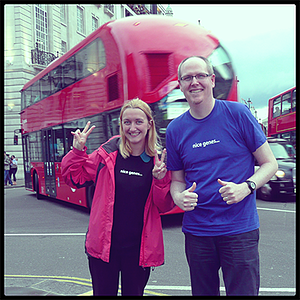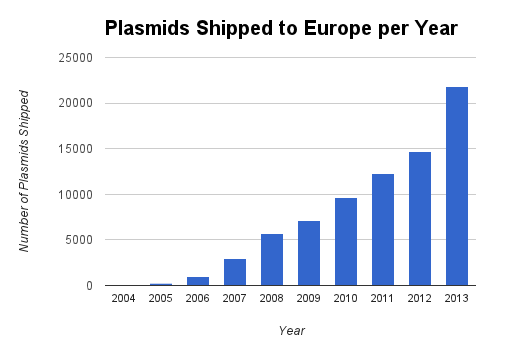 UPDATE - As of January 2020, Addgene's Europe office no longer handles customer support inquiries. The office is now focused on scientific outreach and community engagement. Information about contacting Addgene can be found on our Contact page.
UPDATE - As of January 2020, Addgene's Europe office no longer handles customer support inquiries. The office is now focused on scientific outreach and community engagement. Information about contacting Addgene can be found on our Contact page.
You’ve called. You’ve emailed. And Addgene has been there to answer your plasmid questions. But until now, you’ve always had to call the United States - Cambridge, MA to be exact. Today, that changes.
Today, Addgene launches a brand new Europe office located in London and operated in collaboration with LGC Standards. And now you’ll be able to call us - Benoit Giquel and Emma Markham - the newest Addgenies. Got a question at 9:00am GMT? We’ll be poised and ready to answer your questions about Addgene, plasmids, and depositing (all while our US counterparts are still sleeping).
Plasmid sharing in Europe: Addgene’s request statistics
Since 2004, Addgene has shipped more than 75,000 plasmids to more than 1,500 different institutions in Europe. In the last four years alone, the number of plasmids distributed to Europe has doubled going from 9,500 in 2010 to more than 20,000 in 2013. And the number of plasmids requested by scientists based in Europe over the first five months of 2014 reaffirms this trend.
In addition to this, more and more European scientists have deposited their plasmids into the Addgene repository. More than 4,500 plasmids have already been deposited at Addgene by over 250 scientists in Europe. Despite these fantastic numbers, a lot of European scientists and institutions are not aware of what Addgene can do for them and how the repository can help them share their materials. The new office in London is dedicated to helping them find their way to new scientific discoveries.

At your service: Addgene’s London office
Just a few weeks ago I became the newest Addgene Outreach Scientist - the first to be located in London and focused on supporting European scientists. Born a french frog, I moved to Albion six years ago to work as a research associate after having earned a PhD in Developmental Physiology at the University of Paris VII. During my years in research, I developed several new plasmids, including: plasmids to study the dimerization of HLA B27, involved in the onset of spondylarthritis, using Bioluminescence Resonance Energy Transfer (BRET) technique, and plasmids to study the expression of an unknown protein in macrophages/monocytes using lentiviral expression vectors. I also used plasmids made and shared by others to develop an anti-tumour therapy using antibodies targeting dendritic cells. These genetic tools were pivotal in carrying out my studies, and getting them from collaborators was extremely helpful, but with hindsight I wished I had gotten them from Addgene. I really struggled to get those plasmids with the right information and I believe that a lot of European students and researchers are craving, like I was, for a better way to share their plasmids. Now I am on the other side of the force and as an Addgenie I will do all my best to help them in their tasks.
But I won’t be alone. I join another Addgenie in our office in London, Emma Markham. Emma was born in England but has since studied and worked around the world, carrying out her undergraduate work at the University of London and the University of California, specialising in Molecular Biology. She has worked in a range of labs - cancer research, microbiology, virology, and genetics - before going on to complete her Masters degree at Imperial College London in Genetics. Since then she has worked in the the UK, California, Africa, and Australia, viewing science as a global collaboration. This is why she is excited to be working at Addgene, because it brings scientists together from all over the world to exchange research materials in an easy way. She has a passion for science, loving nothing more than discussing a new scientific discovery or invention, and sharing those ideas with others. This love of interacting with people and talking about science makes her the perfect Addgenie and she can’t wait to see how she can help the scientists in Europe with their research.
Europe, we are all geared up to answer your calls, emails, or maybe even visit your lab! We look forward to helping you make some serious discoveries.
10 Years of Plasmid Sharing:
- Interested in more statistics from Addgene's 10 years of plasmid sharing?
- Check out our Top 10 Plasmid Technologies blog post
- Or look at our "10 Years of Plasmid Sharing" Infographic!
- Check out our Top 10 Plasmid Technologies blog post
Topics: Addgene News






Leave a Comment